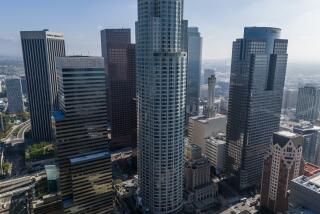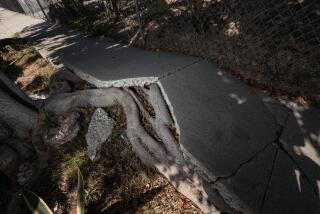Gov. proposes selling L.A. Coliseum, other properties to raise cash
SACRAMENTO — Gov. Arnold Schwarzenegger wants to sell the Los Angeles Memorial Coliseum, San Quentin State Prison, the Orange County Fairgrounds and other state property to raise cash amid the state’s growing fiscal crisis, according to a copy of a proposal reviewed by The Times.
Sale of the properties, to be included in the governor’s revised budget plan today, would raise between $600 million and $1 billion, although it would not provide financial relief for two to five years, according to the proposal.
“There are thousands of buildings and land parcels throughout California that represent billions of dollars of equity,” the plan says. “California’s current fiscal crisis has prompted new ways of thinking about how the state can unlock some of this value.”
Other items on the list for potential disposal include Cal Expo, site of the state fair in Sacramento; the Del Mar Fairgrounds in San Diego County; the Cow Palace, a nearly 70-year-old exhibition hall in Daly City, bordering San Francisco; and the Ventura County Fairgrounds.
It is not clear whether lawmakers would be willing to part with the real estate the governor has identified. Proposals to sell San Quentin and the Coliseum have not advanced in the Legislature in recent weeks.
And many other questions remain unanswered, including where the state would put death row, even as it is spending hundreds of millions of dollars to build new housing for condemned inmates at San Quentin, which sits on a stunning Marin County waterfront property, or how much a new prison would cost.
Administration officials said that almost all the plans would require cooperation from lawmakers, either to approve the sales or make changes to state law to address how the state should handle the proceeds.
One official, who requested anonymity because the governor had not yet announced the plan, said lawmakers who expressed opposition to such property sales in the past might be more willing to compromise now. The state faces a deficit projected at $15.4 billion -- more, if voters reject a slate of ballot measures on Tuesday.
“It’s different times,” the official said. “The choices aren’t great, obviously.”
State lawmakers reached late Wednesday were of mixed minds. Sen. Roderick Wright (D-Inglewood) said selling the Coliseum is a bad idea, because it is well-used and turning a profit.
“You’ve got a depressed market, so you are not going to get its full value,” Wright said. “To try to sell the Coliseum now in a fire sale is not a prudent thing to do.”
Los Angeles County Supervisor Zev Yaroslavsky, president of the L.A. Memorial Coliseum Commission, called the idea of selling the property an attempt to divert attention from the state’s problems.
“The idea is absurd,” he said. “The Coliseum is a national historic monument. You cannot sell it anymore than you can sell the Statue of Liberty or the Washington Monument.”
If the Coliseum were for sale, USC, which signed a long-term lease last year, could be a likely buyer.
“If that were the only way to ensure the Coliseum would be improved and maintained for its current uses, for the right price the university would have to consider it,” said Kristina Raspe, USC’s associate senior vice president for real estate and asset management.
Before agreeing to a deal with the Coliseum Commission last year, the school had offered to run the stadium and invest $100 million in improvements.
State Sen. George Runner (R-Lancaster) called the governor’s plan a “fine idea.”
“There is no reason for the state to keep those assets [and] the cost of maintaining them,” he said.
Schwarzenegger’s proposal would also raise up to $660 million by selling 11 large state office buildings and leasing them back. It is the kind of mechanism used by commercial property owners to free up cash, the governor’s plan says; in some deals, the original owner would receive the site back after a period of time, perhaps 25 years.
The Ronald Reagan building in downtown Los Angeles is on a list of such sites in the proposal, along with others that house the state attorney general’s office, the Franchise Tax Board and the California Emergency Management Agency in Sacramento, and the Public Utilities Commission in San Francisco.
A proposed alternative is restructuring debt on state office buildings instead of selling them and leasing them back. That could provide cash in the short term but higher costs in the long term, the plan says.
Most of the large properties the state would sell, including the 30 acres that contain the Coliseum and the Sports Arena, are controlled by District Agricultural Associations, state entities run by boards appointed by the governor. Officials said they wanted to sell the Coliseum land and buildings. The state is a part-owner of the buildings, and officials said they were still researching the stakes of other owners.
The Coliseum Commission currently leases the land from the local agricultural association and subleases it to USC.
The plan contains brief sales pitches for each of the properties.
The Orange County Fairgrounds, for instance, is “very well located in the coastal community of Costa Mesa,” near the 55 Freeway, making it “a very high value, centrally located . . . development opportunity for Orange County.”
Del Mar Fairgrounds is north of San Diego and includes several pavilions, a grandstand and racetrack. The property is across from the ocean, leading to the slogan “where the turf meets the surf.”
In proposing to sell it for up to $650 million, officials called it “perhaps the state’s most valuable commercially used property.”
--
Times staff writers Patrick McGreevy in Sacramento, Garrett Therolf and Sam Farmer in Los Angeles and Tony Perry in San Diego contributed to this report.
More to Read
Get the L.A. Times Politics newsletter
Deeply reported insights into legislation, politics and policy from Sacramento, Washington and beyond. In your inbox three times per week.
You may occasionally receive promotional content from the Los Angeles Times.










